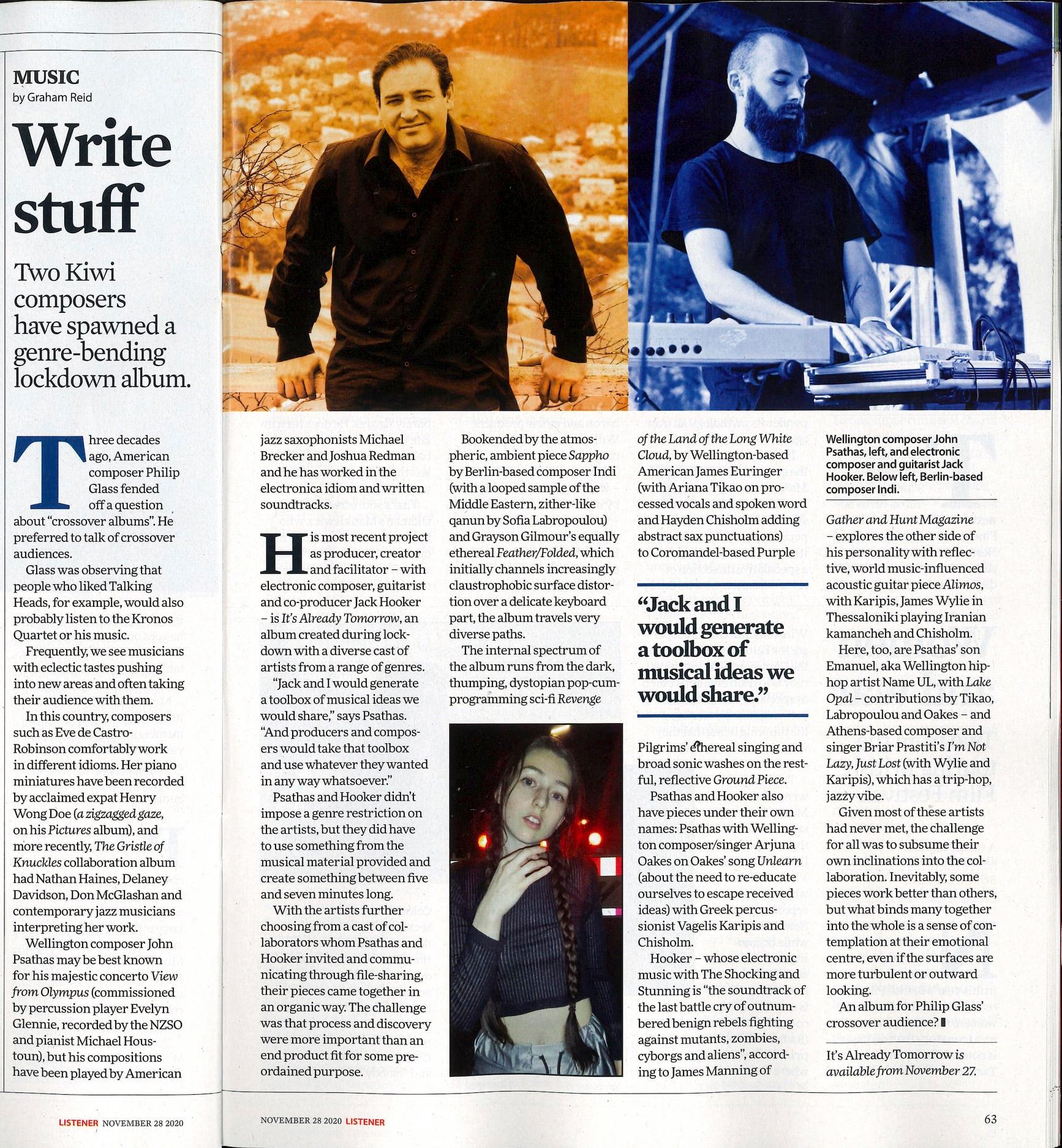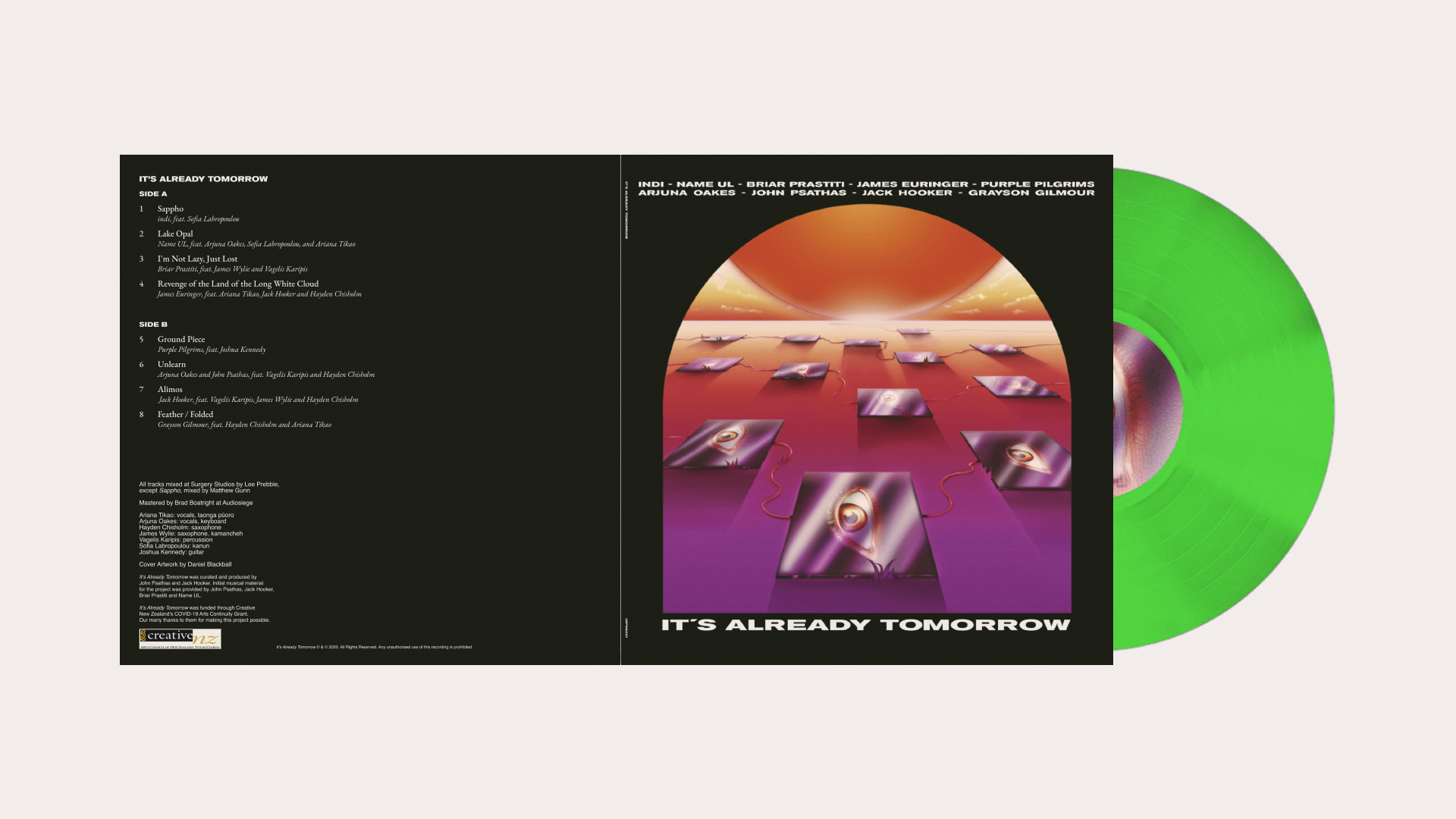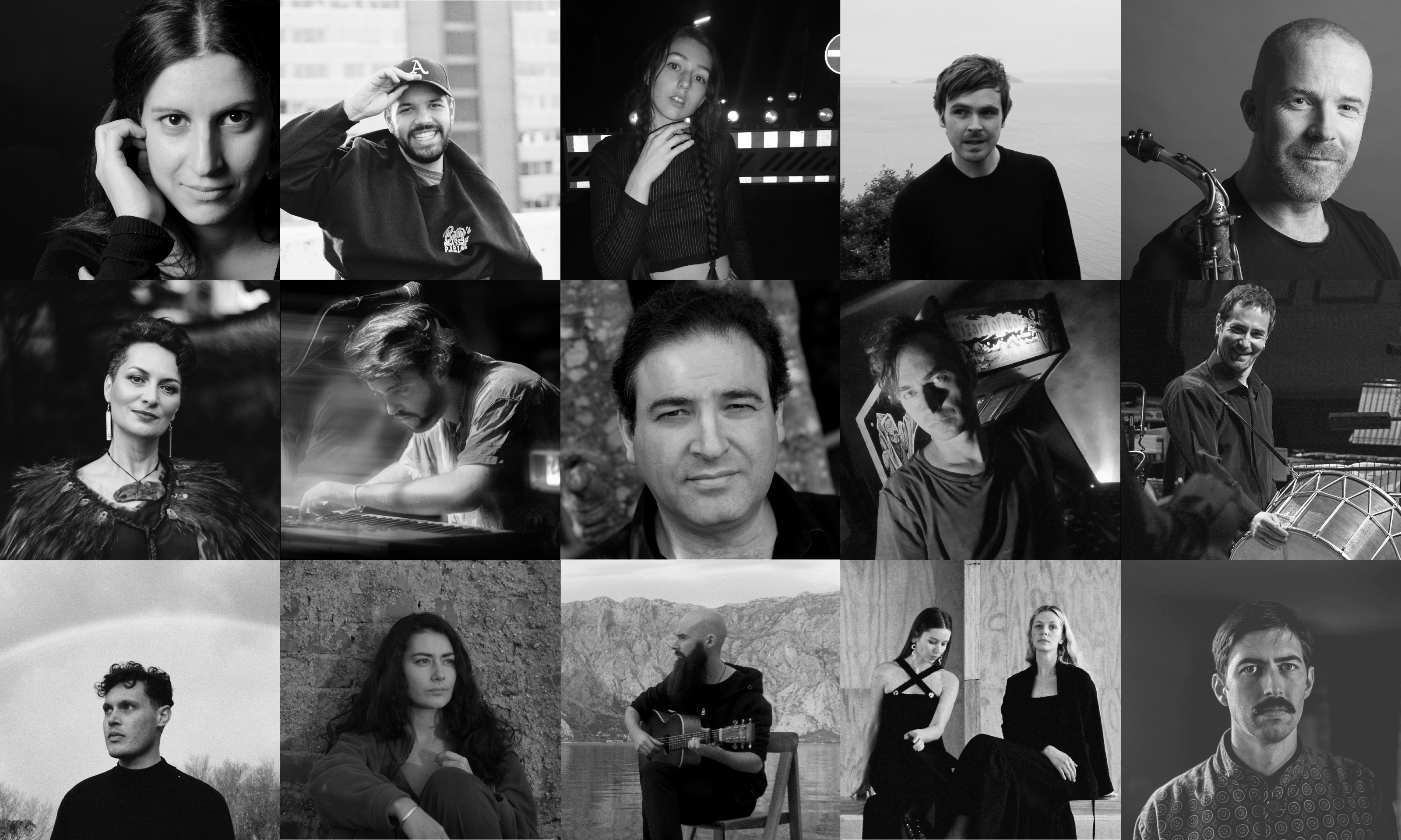
It's Already Tomorrow (album) with Various
Overview
The It's Already Tomorrow project was curated and produced by John Psathas and Jack Hooker, funded through Creative New Zealand’s COVID-19 Arts Continuity Grant. Our many thanks to them for making this project possible. All tracks mixed at Surgery Studios by Lee Prebble, except ‘Sappho’, mixed by Matthew Gunn Mastered by Brad Boatright at Audiosiege. Cover Artwork by Daniel Blackball.
Eight new luminous tracks harvested from NZ artists redefining themselves in the pandemic.
Anxious artists in quarantine experiencing a powerful need for new motivation. Trapped in their own bubbles, opportunities to collaborate and create meaningful music are suddenly way more precious than they were in the past. And so, the family of It’s Already Tomorrow is born.
The fruits of a long-distance lockdown collaboration from New Zealand producers and guest performers living in Germany, Greece, Serbia, and home in Aotearoa New Zealand. From introspective ambient tracks to hybrid folk-electronica to dystopian synth-rock, this album refuses easy categorisation. But one thing across all the emotional intensity is a strong placement in the immediate historic moment. This music is from right now by artists profoundly living and feeling the convulsions in the world around them. The future’s here, now what?
“Powerful, strange, beautiful utterances from the here and now, all grown from the same musical seeds.”

INDI
Sappho - This song was inspired by the sample of Sofia Labropoulou’s kanun playing. The way she played it sounded very intimate, but also had strong momentum that intensified over time. The idea was to use a lot of delicate plucked string instruments to build something with physical energy and weight. Even before the pandemic, there were a lot of ongoing global issues that seemed irreparable and they continue to grow more complex because of the virus. It's still unclear if I was trying to examine these systems or create a utopic alternative, maybe both.

Sappho - This song was inspired by the sample of Sofia Labropoulou’s kanun playing. The way she played it sounded very intimate, but also had strong momentum that intensified over time. The idea was to use a lot of delicate plucked string instruments to build something with physical energy and weight. Even before the pandemic, there were a lot of ongoing global issues that seemed irreparable and they continue to grow more complex because of the virus. It's still unclear if I was trying to examine these systems or create a utopic alternative, maybe both.
NAME UL
Lake Opal to me is a track about escape. When the world went into lockdown and I felt locked in to this part of the world after spending the last couple of years in the UK/EU I started to write music in a way that captured the feeling of needing to be free. The image in my mind when I was making this piece was sitting on the side of a lake alone with a big sky full of stars above me.

BRIAR PRASTITI
I’m Not Lazy, Just Lost is perhaps a need to prove to the observer of my world, that my lack of movement is due to something much more mysterious than the unwillingness to be productive. What I can say at least, is that I see that many people have been told to sit still. This is true. When the world gave us an opportunity to be quiet, we took it in panic. And filled our days with one or the other: over-drive, or under-drive. Where is the ability to carry on without the frame to this picture? How is the shape of her when she sits still? I guess this is as close to the meaning I can reach. But the meaning is yours. I wouldn’t want to define it for you.
Everything I create is delivered as a message from the subconscious, and the meaning is derived much later. Just as you have no control over your dreams, but you understand them upon waking, their completion. Maybe the meaning is inseparable from the act of creating itself. Admittedly, I was stuck, directionless, and unmotivated - perhaps a result of the isolation of the pandemic - and what one would view as absurdly ‘lazy’. But this impression clearly sits on the surface. The real theme is being lost, without connection. I’m not lazy. I’m just lost.

JAMES EURINGER
The Revenge of the Long White Cloud is a sci-fi dystopian story about an ancient indigenous Polynesian supercomputer becoming sentient and deciding to punish mankind for all its evils by destroying the world. Looking around at the current state of affairs in the world today I definitely feel any advanced A.I. would want to either control us to stop us from our own evils, or destroy us to start over again anew. Any highly logical machine or biomechanical organism seeing the complete illogical state of the world would definitely try and re-program the earth from scratch, and at this point that might be a good thing.

PURPLE PILGRIMS
Ground Piece - We wrote the piece mid lockdown after (like countless others) our year’s worth of travel plans were halted. We were supposed to be in Austin, TX performing at South by South West at the time. Expecting to be a million miles away, we were grounded quite literally in our current home in rural Coromandel - and found ourselves reflecting on the literal piece of earth we so happened to be stranded on. Considering the countless phases and states of being that this land has undergone, and human beings’ transitory existence upon it. We began with an ambient track and started layering textures with a mind to evoke those phases and changes through time. Overall we wanted to create a feeling of power vs. fragility, something that felt very grounded yet at the same time as though it had drifted in on the wind and could just as easily disappear. Our collaborator Joshua Kennedy who played guitar on the piece was in lockdown in Auckland city at the time, we bounced ideas back and forth with him and the whole process came together very naturally. Hopefully this piece of music acts as a breath, a space for calm reflection amid the chaos and somewhat shaky ground we collectively find ourselves on currently.

ARJUNA OAKES & JOHN PSATHAS
Unlearn is a song designed to facilitate a cathartic experience. Written during the lockdown, and at the height of the black lives matter protests earlier this year, unlearn is about the process of re-educating oneself in order to pick apart falsehoods that we may have been fed throughout our lives. As a privileged pakeha, Arjuna felt it was his responsibility to educate himself in this regard, watching documentaries on systemic racism and the effect of mass media on minority communities, such as 13th and Disclosure. This made Arjuna realize that mainstream media had a massive effect in subliminally shaping people’s views and that in order to properly support a social movement as a privileged person, one had to actively pull apart and reassess these views. The theme of unlearning is not only reflected by the lyrical content but also by the musical content and structure of the song. The ever-shifting chord progression and the use of an array of electronic and organic instruments creates a somewhat uncomfortable atmosphere, which relates to how it often feels when picking apart one's views. The structure of the song is also meant to reflect the process of unlearning, with a ‘rote-learning-like’ chant in the middle of the song, which then leads into a section similar to the first, but stronger and somewhat changed through the process.

JACK HOOKER
Alimos is an attempt to continue forging international musical connections across closed borders. The piece brings together a multi-cultural ensemble from opposite ends of the world; Vagelis Karipis recorded Greek percussion in Athens. James Wylie recorded Iranian kamancheh in Thessaloniki. Hayden Chisholm recorded Soprano Saxophone in Belgrade, and I recorded acoustic guitar back home in the Kapiti Coast. The ensemble section is bookended by a guitar meditation that reflects on lockdown and isolation

GRAYSON GILMOUR
Feather / Folded muses on Mother Nature's 'monumental indifference' (to cite Herzog) towards mankind, despite the havoc we wreak on the planet. My studio looks out over the hills of Te Kopahou reserve, which loosely translates to 'a bent, or folded feather', and I find a great sense of peace in witnessing this indifference while I work; Mother Nature may very well reclaim these hills - perhaps sooner than we're willing to acknowledge.
Also featuring performances by



Producer: John Psathas and Jack Hooker
Artists: Indi, NAME UL, Briar Prastiti, James Euringer, Purple Pilgrams, Arjuna Oakes and John Psathas
Featuring: Hayden Chisholm, James Wylie, Sofia Labropoulou, Ariana Tiako, Joshua Kennedy, Vagelis Karipis
Mixing Engineer: Lee Prebble at Surgery Studios (all tracks excpet 'Sappho'), Matthew Gunn for ‘Sappho’,
Mastering: Brad Boatright at Audiosiege.
Cover Artwork: Daniel Blackball.
Funder: Creative New Zealand’s COVID-19 Arts Continuity Grant
Listen Now
Listen Now
Gallery
Videos
Purchase this piece
Credits
The It's Already Tomorrow project was curated and produced by John Psathas and Jack Hooker
It's Already Tomorrow was funded through Creative New Zealand’s COVID-19 Arts Continuity Grant. Our many thanks to them for making this project possible.
All tracks mixed at Surgery Studios by Lee Prebble, except ‘Sappho’, mixed by Matthew Gunn Mastered by Brad Boatright at Audiosiege Cover Artwork by Daniel Blackball
Media enquiries, images & more information contact: Cheree Ridder | chereeridder@gmail.com
General enquiries: John Psathas | john@johnpsathas.com Jack Hooker | hello@jackhooker.co.nz
Interview videos recorded/edited by Ben Dickens Website design by Kenyon Shankie & Patricia Nunez




